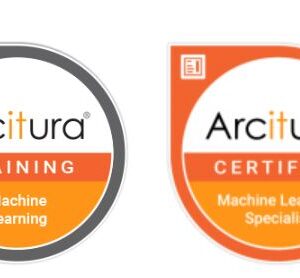The Containerization Architect track is comprised of modules that develops skills in containerization technology and architecture, along with proficiency in assessing, designing and securing highly available container-hosted services and solutions. The final course module consists of a series of lab exercises that require participants to apply their knowledge of the preceding courses in order to fulfill project requirements and solve real world problems. Completion of these courses as part of a virtual or on-site workshop results in each participant receiving an official Digital Certificate of Completion, as well as a Digital Training Badge from Acclaim/Credly.
To achieve the Containerization Architect Certification, Exam CN90.01 must be completed with a passing grade. A Certified Containerization Architect understands how containerization technology can be utilized to deliver highly available, scalable and optimized business solutions. In addition to a deep understanding of the inner workings of containerized environments and multitenancy technology, the Certified Containerization Architect is proficient with the design of containerization-based technology architectures, including the utilization of container engines, templates and management solutions that encompass monitoring, scheduling, storage management and rapid deployment. Those who achieve this certification receive an official Digital Certificate of Excellence, as well as a Digital Certification Badge from Acclaim/Credly, with an account that supports the online verification of certification status.
Duration
3 days
Course Outline:
Module 1: Fundamental Containerization
This module provides comprehensive coverage of containerization models, technologies, mechanisms and environments. In addition, the module covers how the utilization of containers impacts both the technology and business of an organization, along with many technical features, characteristics and deployment environments.
Primary topics covered are:
– A Brief History of Containerization
– Traditional Linux Containers and the Evolution of Contemporary Containers
– Containers vs. Virtual Machines and Server Virtualization
– LXC/LDX, Docker and Kubernetes
– Technical and Business Benefits and Challenges of using Containers
– Fundamental Container Architectural Models
– Container Engines, Build Files and Images
– Cloud-based Containers and Container Pods
– Fundamental Container Scalability and Availability
– Container Configuration Management
– Containers and Immutable Infrastructure Resources
– Containers and Infrastructure as Code (IaC) and Configuration as Code (CaC )
– Containerizing Stateful Applications
– Containers and Namespaces
– Fundamental Containerization Patterns and Mechanisms
– Rich Containers and Serverless Deployment
– Container Chains and Sidecars
– Application Mobility with Containers
– How Containers Relate to and Support Microservices and Machine Learning
– Utilizing Containers with DevOps and CI/CD
Module 2: Containerization Technology & Architecture
This module provides a deep-dive into containerization architectures, hosting models, deployment models and utilization by services and applications. The module will also cover advanced topics such as high-performance requirements, clustering, security and lifecycle management.
Primary topics covered are:
– Hyper Containers and Containers Deployment Models
– Customizing and Distributing Container Images
– Container Image Version Control
– Advanced Container Architectural Models
– Container Execution Environments
– Container Networking Model and Overlay Networking
– Managing and Controlling Container Traffic Types
– Container Storage Management and Shared Volume Management
– Container Configuration Descriptor
– Runtime Management and Volatile Configurations
– Container Clustering and Scalable Cluster Architectures
– Container Proxies and APIs, Orchestration and Service Composition
– High-Availability Containers and Advanced Container Scalability
– Self-Healing Applications with Containers
– Container Security Considerations and Digital Certificates
– Container Lifecycle Management and Monitoring Containers, Backup and Recovery
– Advanced Containerization Patterns and Mechanisms
– Single-Node Multi-Containers and Multi-Container Isolation Control
– Leader Node Election and Micro Scatter Gather
Module 3: Containerization Technology Lab
This course module presents participants with a series of exercises and problems that are designed to test their ability to apply their knowledge of topics covered in previous courses. Completing this lab will help highlight areas that require further attention and will help prove hands-on proficiency in containerization concepts, technologies, architecture models and pattern application, as they are utilized and combined to solve real-world problems.
For instructor-led delivery of this lab course, the Certified Trainer works closely with participants to ensure that all exercises are carried out completely and accurately. Attendees can voluntarily have exercises reviewed and graded as part of the class completion.
More about Arcitura Certifications here
For more details, contact us






